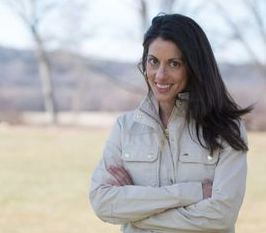This week, journalist Stephanie Hanes presented to biology and AP Environmental Science students about her work reporting from Gorongosa National Park in Mozambique, the subject of her newly released book, White Man’s Game: Saving Animals, Rebuilding Eden, and Other Myths of Conservation in Africa.
 In the book “[Hanes] traces the tangled history of Western missionaries, explorers, and do-gooders in Africa, from Stanley and Livingstone to Teddy Roosevelt, from Bono and the Live Aid festivals to Greg Carr, the American benefactor of Gorongosa. And she examines the larger problems that arise when Westerners try to “fix” complex, messy situations in the developing world, acting with best intentions yet potentially overlooking the wishes of the people who live there.”
In the book “[Hanes] traces the tangled history of Western missionaries, explorers, and do-gooders in Africa, from Stanley and Livingstone to Teddy Roosevelt, from Bono and the Live Aid festivals to Greg Carr, the American benefactor of Gorongosa. And she examines the larger problems that arise when Westerners try to “fix” complex, messy situations in the developing world, acting with best intentions yet potentially overlooking the wishes of the people who live there.”
For example, as Hanes explained to students at Crossroads, western conservationists and native Sena people have differing reactions to crocodile attacks on people.
Science teacher Howard Granok, who hosted the event, says there were many good questions for Hanes. One student asked about differences in societal norms she may have experienced among the Sena people. Hanes said she was always welcomed warmly, but notes there are cultural differences, such as the ongoing practice of polygamy among some wealthy Sena families.
Another student asked whether native people are aware of the significant environmental issues facing the region. Hanes responded that many who live in the area around Gorongosa National Park have very little communication with the outside world. They may have noticed more extreme droughts, but probably don’t have understanding of the larger context.
She said the use of charcoal, which is produced from trees, as fuel has become a problem in the region. Traditional harvesting practices involved replanting trees, but the Mozambican Civil War (1977-1992) upset this custom, resulting in deforestation. Many Westerners encourage alternative fuel use as a solution, but Hanes considers it more important to restore traditional sustainability practices.
 Hanes’s visit was part of the Global Gateway outreach program, sponsored by the Pulitzer Center on Crisis Reporting and Civitas Associates. Arthur Lieber, founder of both Crossroads and Civitas, introduced the morning’s presentation.
Hanes’s visit was part of the Global Gateway outreach program, sponsored by the Pulitzer Center on Crisis Reporting and Civitas Associates. Arthur Lieber, founder of both Crossroads and Civitas, introduced the morning’s presentation.
In addition to her book, you can read Hanes’s feature reporting in the Christian Science Monitor, or watch her 2015 TEDx talk about “moving beyond the journalistic fear narrative.”
